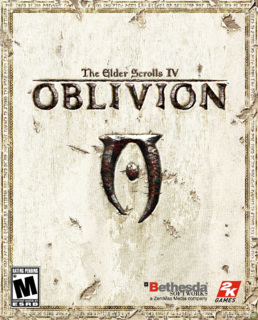O.K., I'm 70 hours in, and I feel safe making some definitive statements about Oblivion.
POSITIVES
1. See above. 70 hours! No matter what criticisms we might come up with, 70 hours on a game happily engaged is no minor achievement.
2. I probably have another 70 hours or more if I want it. Also a major achievement. I have essentially ingored the main quest and most of the side adventures you could take on the map. In other words, I've done most of the Thieves' Guild and Mages' Guild stuff. This means I have TONS of content left to go. Along the way, some of the quests were surprisingly fresh in terms of new spins on "Find x item and return it to person y."
3. All my hardward upgrade woes (and expense) were worth it. The game is simply a joy to look at.
NEGATIVES
1. At some point, a lot of the 70+ hours become mere variations on a theme. I think this is where Oblivion's on-line, group-based brethren have the secret to true longevity: shared experiences with friends that offer something new each session (new at least in terms of human-human interaction). Oblivion ends up feeling pretty lonely. You're this sole figure, usually fighting enemies one at a time. Ultimately the grand open-endedness of the game also opens the game to another weakness coupled with lonliness: each quest must be programmed as a self-contained unit (since who knows when you'll start it?), and although the game tries to recognize what you've done in a logical way ("Hey, you're the hero of Kavatch!"), what you essentially get in a trade off for open-endedness is 1,000 quests that can be tackled as 1,000 very similar mini sessions. Sure, there is an overall plot but no urgency. I think maybe there should be a timer running, after which time if you haven't closed x number of gates by date x, creatures get harder or something?
2. Thus, the remaining content now is approach that "chore" feeling. Do I really want to clear out another cave? True, the monsters and treasure are scaling to my level, so the challenge and reward are always growing...but the method and suspense aren't. Again, to come up with 140 hours of engaging SP content would be close to a miracle, but it's not really a miracle I see happening in Oblivion.
3. I'm looking forward to some code optimization that will finally let my newfound hardware run the game with NO slow-downs. Wish me luck.
CONCLUSION
Ultimately Oblivion is one of those games that any RPGer *must* play in order to witness an important moment in the genre's history. And hey, even if you "only" get 50 hours or so of engaging gameplay out of it before the routines gets tired, it's still a great-looking and typically great-playing experience. In the end, though, I think the next game in the series needs to take the Oblivion trend to its logical conclusion: Make particular quests and plot line even more important (at least we can easily keep track of and find them in Oblivion) and give a second thought to making the game TOO open-ended. Beyond quests, if every player can become a sword-wielding, stealth-mastering, spell casting demi-God of all trades, then where are the strategic choices to be made in character creation and game play? Unfortunately, Oblivion can easily digress to a mundane game of upping all your stats all the time so you never have to compromise on anything. True, a patient role-player could avoid this, but the game begs it. For example, I realized I could set my character to auto sneak ('q' key) into a rock with my horse looking the other way. The result? Go make some tea and come back with +5 sneak skill. I stopped at that point so I wouldn't ruin the illusion any further --and this is an exploit easily avoided by the player -- but the question still hit me: Heck, why not just max out these stats and move on with being God?
Well, I didn't really want to be God...just a good thief. Somewhere along the way, I failed the game, and the game failed me. But no matter all that, 70 hours with many more mods and opportunities to come back means that Oblivion is a major success in my (over-stuffed spell) book.

